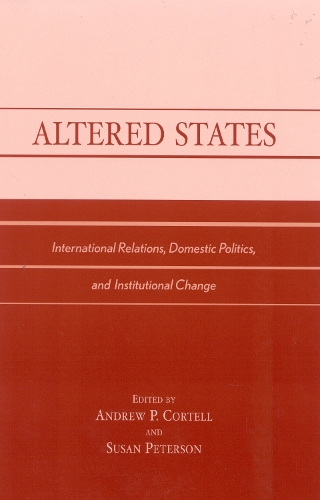
Altered States: International Relations, Domestic Politics, and Institutional Change
(Paperback)
Publishing Details
Altered States: International Relations, Domestic Politics, and Institutional Change
By (Author) Andrew P. Cortell
Edited by Susan Peterson
Contributions by Eva Busza
Contributions by Jeffrey T. Checkel
Contributions by Lisa Conant
Contributions by Darren Hawkins
Contributions by C S. Eliot Kang
Contributions by David Richards
Contributions by Martin J. Smith
Contributions by Christopher Wenk
Bloomsbury Publishing PLC
Lexington Books
13th February 2003
United States
Classifications
Tertiary Education
Non Fiction
Constitution: government and the state
306.2
Physical Properties
Paperback
250
Width 154mm, Height 227mm, Spine 19mm
390g
Description
Scholars in the social sciences have recently rediscovered the role that a country's formal institutions - for example, its policy-making processes, the role of its judiciary, and its state-societal relations - and its formal institutions, including norms and customs, play in shaping politics. Conventional wisdom suggests that institutions change only rarely and massively: large-scale changes follow wars, depressions and crises. "Altered States" develops a "new institutionalist" perspective - using seven case studies from the United States, East and West Europe, Cuba, Russia and the former Soviet Union - which shows how institutions change more frequently and incrementally than commonly expected, and demonstrates the key role that reform-minded policy entrepreneurs play in inducing institutional transformation. This important new collection is an innovative combination of cross-national empirical investigations and theoretical explanation of the roles national institutions play in affecting policy change.
Reviews
Altered States is an important study of the sources of institutional change. It rightly focuses on advancing our understanding of incremental change and intentional design. The rich variety of empirical examples highlight the important consequences of institutional reforms. -- Elizabeth Kier, University of Washington
[This book] will open many avenues for conducting new research into a field of international relations and comparative politics, and will further sharpen our understanding of the politics of this world in which institutions clearly "matter." * H-Net: Humanities and Social Science Reviews Online *
Over the years scholars of international and comparative politics have made great progress in understanding the impact of state structures and institutions on foreign and domestic policy. They often associated dramatic changes in policy with prior institutional changes, yet left open the key question of when and why instituttions themselves change. In this pathbreaking volume, Andrew Cortell and Susan Peterson have assembled a collection of high-quality essays addressing this question in a wide range of issue-areas and with a geographical scope that encompasses the European Union, the former Soviet Union and Eastern Europe, Cuba, the United States, Britain, and Japan. The chapters are theoretically sophisticated, empirically rich, and the volume as a whole constitutes an important advance in our understanding of institutional change. -- Matthew Evangelista, Cornell University, editor of Italy from Crisis to Crisis: Political Economy, Security, and Society in the 21st Century
Author Bio
Andrew P. Cortell is Assistant Professor in the Department of International Affairs at Lewis and Clark College. Susan Peterson is Associate Professor of Government at the College of William and Mary. She is the author of Crisis Bargaining and the State (1996).
